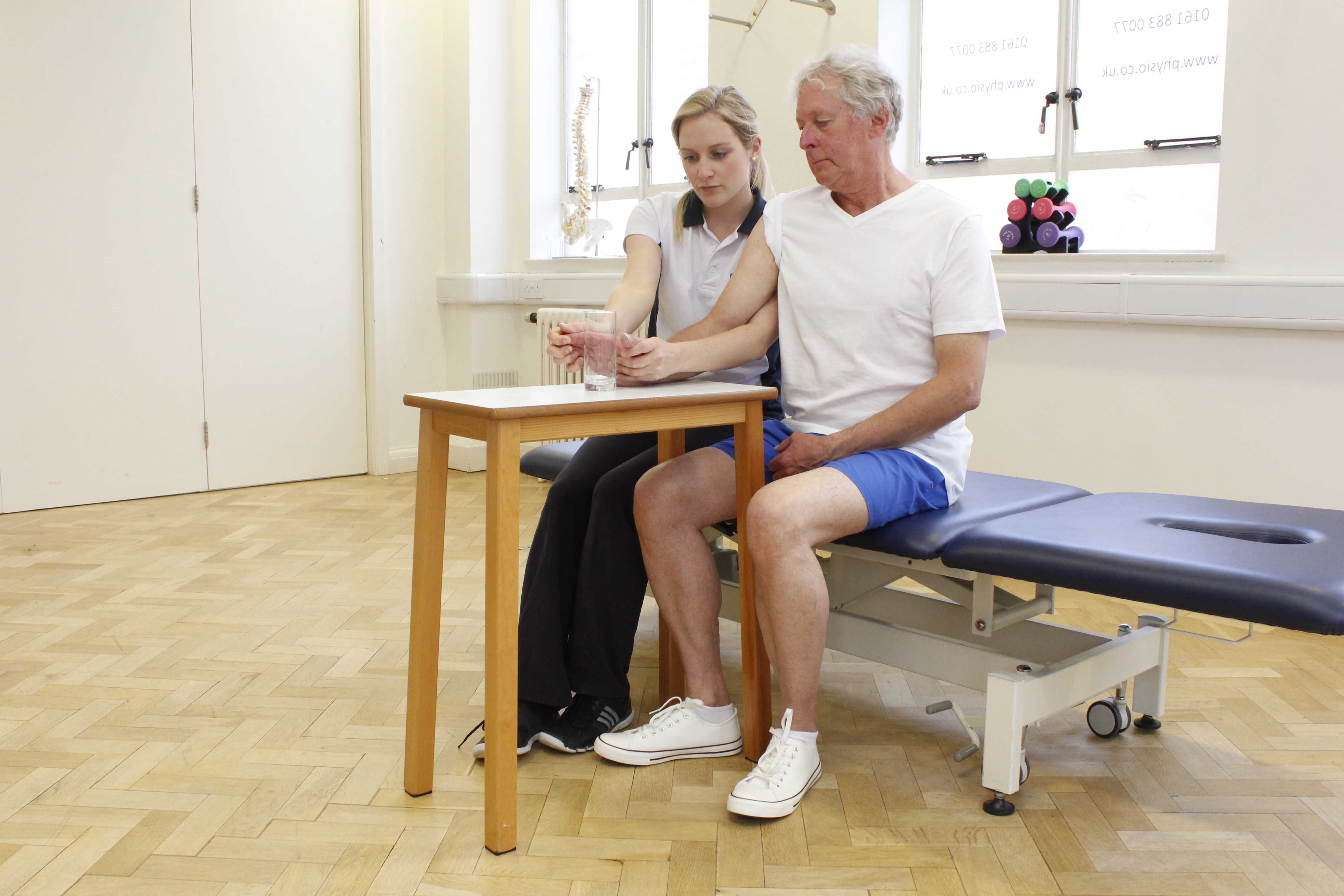What is a triangular fibrocartilage complex tear?
The triangular fibrocartilage complex (TFCC) is a triangular-shaped piece of cartilage located within the wrist joint. It is attached to the end of both of the forearm bones. A triangular fibrocartilage complex tear is an injury to this cartilage complex. Physiotherapy is an important treatment for TFCC.
How does a triangular fibrocartilage complex tear happen?
A tear of the triangular fibrocartilage complex commonly occurs when using the hand to break a fall or when performing activities using the hand to support body weight, such as in gymnastics.
 Above: Functional rehabilitation exercises for the hand and wrist guided by a specialist physiotherapist
Above: Functional rehabilitation exercises for the hand and wrist guided by a specialist physiotherapistWhat are the symptoms of a triangular fibrocartilage complex tear?
A triangular fibrocartilage complex tear causes pain in the wrist joint. This pain is usually worsened if weight is put through the joint. Movement can also cause a clicking sensation within the wrist. The wrist may also swell. This is usually seen over the back of the wrist. Other symptoms include:
What should I do if I have a triangular fibrocartilage complex tear?
If you have torn your triangular fibrocartilage complex, you should begin initial treatment. This should consist of the RICE regime (Rest, Ice, Compression, Elevation). Ice should be applied to the injured site for 15–20 minutes every 1–2 hours using a bag of frozen peas or crushed ice wrapped in a moist cloth or towel. Compression involves the application of an elastic bandage around the wrist and elevation involves lying or sitting with your wrist resting comfortably on a chair or pillows so that it is above the level of the heart. You should also consult a physiotherapist as soon as possible following the injury.
Physiotherapy treatment for a triangular fibrocartilage complex tear.
Initially, your physiotherapist can assess your wrist and the extent of the damage. This may require referral for an X-ray, CT or MRI scan, or referral to an orthopaedic surgeon. From this assessment, they can usually provide you with an estimation of how long the injury is expected to take to heal and devise an appropriate treatment plan.
Treatment varies dependent on the severity of your injury but may involve wearing a splint, undergoing treatments such as electrotherapy to decrease pain and swelling, and performing stretching and strengthening exercises. When you do return to normal activity, your physiotherapist will be able to advise you on and provide you with protective equipment such as a wrist brace or strapping, if required, to prevent further injury.
Other treatment options include:
- Wax therapy
- Soft Tissue Treatment
- Massage
- Manipulation / Mobilisation
What shouldn’t I do if I have a triangular fibrocartilage complex tear?
If you have or suspect you have a triangular fibrocartilage complex tear, you should not perform any activities which increase blood flow to the injured area. These activities include hot showers, heat rubs, massage and the consumption of alcohol. These may increase swelling around the injury site and potentially prolong your recovery.
Could there be any long-term effects from a triangular fibrocartilage complex tear?
Most triangular fibrocartilage complex tears get better within a number of weeks. However, a proportion of injuries can result in longer-term effects. The effects depend on the severity of the injury and the extent of the damage to the cartilage. In severe tears, surgery may be required to remove the area of torn cartilage to provide relief from symptoms. In these cases, recovery may be prolonged. Recovery may also be prolonged if structures other than the triangular fibrocartilage complex are injured. These include the wrist or forearm bones and the wrist ligaments.
To arrange a physiotherapy assessment call Physio.co.uk on 0330 088 7800 or book online today.

 0330 088 7800
0330 088 7800

































